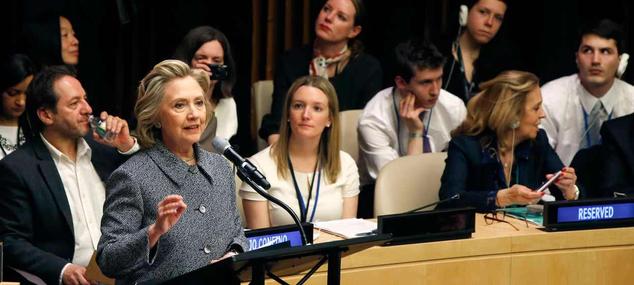Story Highlights
- Women quite positive toward Clinton, men are divided
- Women have long rated Clinton better than men have
- Clinton top-rated potential 2016 candidate among women
PRINCETON, N.J. -- Women continue to have a much more positive opinion of Hillary Clinton than men do. Fifty-six percent of women have a favorable opinion of Clinton, while 32% view her unfavorably. Men are evenly divided in their opinions of Clinton.
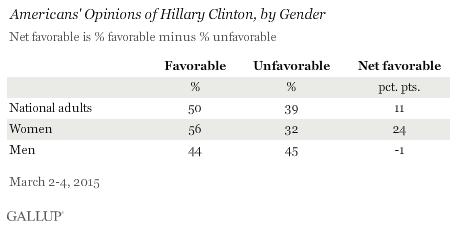
The results are based on a March 2-4 Gallup poll, conducted as revelations about her use of a private email account to conduct government business were emerging, but before she publicly addressed the issue. Clinton is expected to officially announce her presidential candidacy for the 2016 election next month. Her combination of high familiarity among the general public and more positive than negative favorable ratings puts her in a more advantageous early position regarding her image than any of her potential 2016 rivals.
Clinton owes much of her strong early position among possible 2016 candidates to her appeal to women. This gender difference in her image ratings is not new; Gallup has previously documented wide gender gaps in views of Clinton while she was first lady, U.S. senator, a presidential candidate in 2008, and most recently, secretary of state.
Not only is there a gender gap in Clinton's overall favorable rating, but all major female demographic groups view Clinton more positively than do their male counterparts, including by age, education, race, marital status and partisanship. In nearly every comparison, Clinton's favorable rating is 10 percentage points higher for women than men in the same subgroup. Her net favorable rating -- the percentage who views her positively minus the percentage who views her negatively -- is typically 20 points higher for women than for men who share the same characteristic.
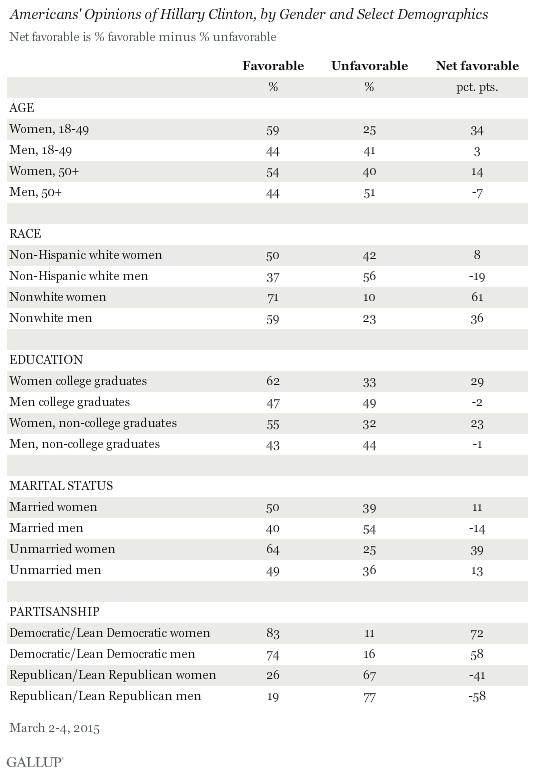
Aside from Republican women, each of these groups of women views Clinton more positively than negatively. But her image is more positive among younger women than older women, among unmarried women than married women, and among nonwhite women than white women, largely reflecting broad partisan differences by subgroup in the U.S. There is only a modest difference in how female college graduates and non-graduates view Clinton.
Women Most Positive Toward Clinton in Potential 2016 Field
Among all major potential 2016 presidential candidates from either party that Gallup tested in the recent poll, Clinton has the highest favorable rating by far (56%) among U.S. women. Joe Biden ranks a distant second among women in overall favorability (41%), followed by Jeb Bush with 32%. Her +24 net favorable rating also is substantially better than any other possible candidate's rating.
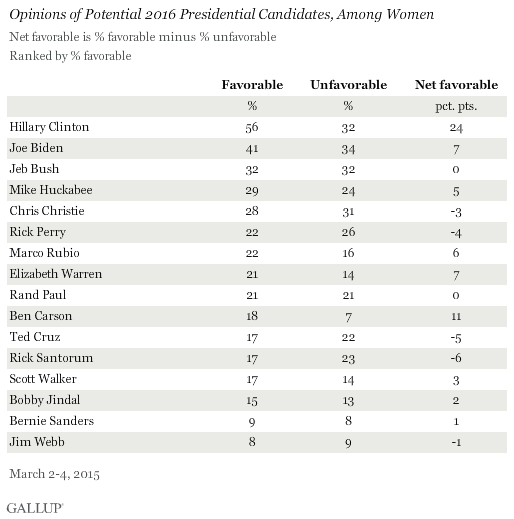
Relative to her competitors, Clinton was not in as same strong a position among women early in the 2008 campaign as she is now. A March 2-4, 2007, Gallup poll shows Clinton's 60% favorable among women at the time was matched by Rudy Giuliani's 61%, with Barack Obama (57%), John McCain (54%) and John Edwards (51%) close behind.
Reflecting her high visibility relative to her other potential rivals in the 2016 campaign, Clinton's 44% favorable rating among men is higher than any other potential candidate, although her -1 net favorable rating trails several Republican candidates' ratings.
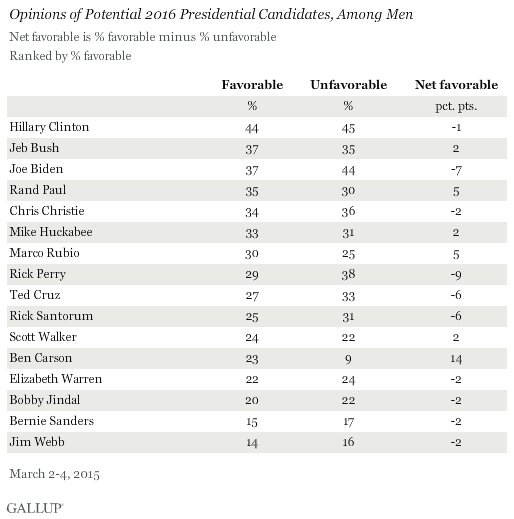
Clinton Leads Other Democratic Candidates Among Democrats of Both Genders
Clinton must first win the Democratic nomination before Americans can elect her president. And currently Democratic women and Democratic men view her more positively than any of her potential challengers for the nomination. Eighty-three percent of Democratic women view Clinton favorably, with Biden next at 65%. Clinton's 74% favorable rating among Democratic men exceeds Biden's by 13 points.
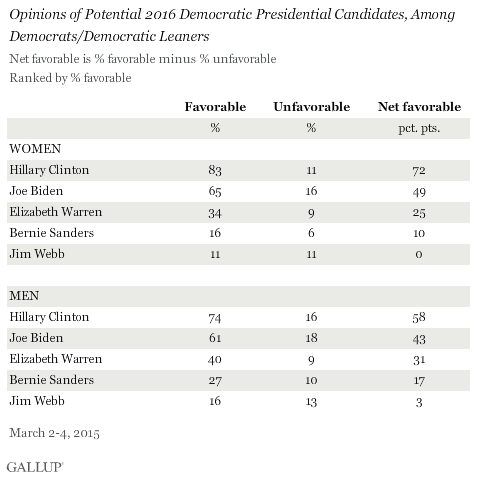
Implications
During her last presidential campaign, Americans' opinions of Clinton varied in response to campaign events. While she is the best known of the potential 2016 presidential candidates, it would not be surprising to see her favorable ratings vary at least slightly between now and the fall of 2016 if she runs for president again. The recent flap over her email use is the kind of event that could cause some changes Americans' opinions of her.
One thing that has been consistent in Clinton's more than two decades in the public eye is that women are much more positive toward her than men are. Should she be able to maintain a positive image throughout a presidential campaign, she will have a decided advantage among more than half of the population that her contenders do not share, making her a formidable contender for president. If the Democratic Party nominates her as their candidate and Americans elect her president, Clinton's bedrock of support among women would likely play a substantial role in that achievement.
To defeat Clinton, her challengers from either party would have to weaken her appeal to women as much as possible and develop an equally strong or stronger advantage among men. That is precisely what occurred in the 2008 nomination contest, when Clinton maintained a slim lead among Democratic women, but with Barack Obama enjoying an even larger advantage among Democratic men.
Survey Methods
Results for this Gallup poll are based on telephone interviews conducted March 2-4, 2015, on the Gallup U.S. Daily survey, with a random sample of 1,522 adults, aged 18 and older, living in all 50 U.S. states and the District of Columbia. For results based on the total sample of national adults, the margin of sampling error is ±3 percentage points at the 95% confidence level.
For results based on the samples of 752 men and 770 women, the margin of sampling error is ±4 percentage points at the 95% confidence level.
All reported margins of sampling error include computed design effects for weighting.
Each sample of national adults includes a minimum quota of 50% cellphone respondents and 50% landline respondents, with additional minimum quotas by time zone within region. Landline and cellular telephone numbers are selected using random-digit-dial methods.
Learn more about how the Gallup U.S. Daily works.
